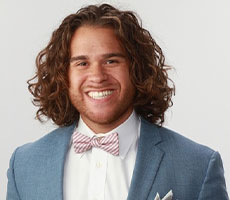The Case for a Better Healthcare System
Jason Rivera
Robert | Family Medicine Apr 22, 2021
Jason Rivera is one of the incoming residents at the University of Colorado Family Medicine Residency. He is passionate about health equity, specifically as it pertains to race relations in this country. He is an advocate for single payer healthcare and has held several local, state, and national leadership positions addressing healthcare disparities and access. Jason is soon moving to Colorado from Florida with his wife, who is a physician assistant in women’s health, and two dogs.
In America, not a day goes by without hearing about our healthcare system negatively. These stories are all too familiar to us. It is plastered all over media. We all have had personal experiences with this. How many times have you heard of someone not going to the doctor because they could not afford to? How many of you had to settle for a “second-line treatment” because the first line treatment cost too much? We have certainly all heard of someone rationing their medications or foregoing them all together due to their outrageous cost. Unsurprisingly, nearly 70% of all Go Fund Me accounts are created to help cover medical expenses. The number one cause of bankruptcy in the United States is due to medical bills, accounting for 60% of total U.S. household bankruptcies each year. The normalization of the absurd cost healthcare in this country has made it a burden to become ill, a taboo that we would not wish on our worst enemy. Is this really the best we can do? As the wealthiest and most powerful nation in the world, I beg to differ.
The current American healthcare system is not efficient. Although we spend more than twice on healthcare per capita than all other industrialized countries, our healthcare outcomes are not better. In fact, they are worse in some respects such as life expectancy and infant mortality rates. So why do we spend so much more for unfavorable outcomes? The reality is that American healthcare is a business. Our health and well-being have become a commodity. Our lives carry a price tag, and this makes our system very effective at excluding those who do not have money, leaving them to fall into the cracks of a very broken cycle of poverty searching for any help they can get.
I am not here to say that I have the solution to this decades-long problem. I am not here to wave a magic wand and fix healthcare. However, I am here to tell you that there is an alternative that we should be aware of. Let me start by telling you that according to the World Health Organization, the U.S. healthcare system ranks 37th worldwide. Coincidentally, every country ranked higher than us has some form of universal coverage. Now before you make a snarky remark and skip the rest of the article, please hear me out. Imagine a healthcare plan without the endless loopholes and money pits, high deductibles, co-pays, and premiums. This plan includes comprehensive dental and vision coverage. People would be able to choose whichever doctor they wish, not only ones who are “in network”. We cut administrative costs substantially and we put the power back into the people’s hands to negotiate better pharmaceutical and medical service prices to end price gouging and corporate greed. We create a healthier working class by guaranteeing the best healthcare we can. This is arguably the best investment we can make into our economy. This is what the future holds with a Medicare for All healthcare plan. This system would save nearly 70,000 lives per year and provide insurance to nearly 80 million uninsured or underinsured Americans.
This is not a pipe dream, but a fiscal reality. A recent study published in February 2020 by top researchers at the Yale School of Public Health estimated that under a Medicare for All plan, we would save an estimated $450 billion dollars each year. I’m no math major, but an extra $450 billion put back into our economy and into our infrastructure while simultaneously providing better care to people seems like a win-win situation to me.
At the end of the day, I am not asking you to change your political views. I’m asking you to consider the reality of this beloved country. Wherever you stand on the political spectrum, we have all have a stake in our healthcare system. I am asking you to challenge your preconceived notions on the perceived complexity of healthcare. I am asking you to have the tough conversations and considerations for others, including the economic status of this country. I certainly cannot sit back and continue to watch people die from a lack of adequate health insurance or see my fellow Americans go bankrupt due to the financial burden of healthcare. I hope that we as a nation will no longer be complacent to a system that has placed profit at the forefront of healthcare at the expense of human lives, and I hope to see a healthier and more profitable future for our ailing country.